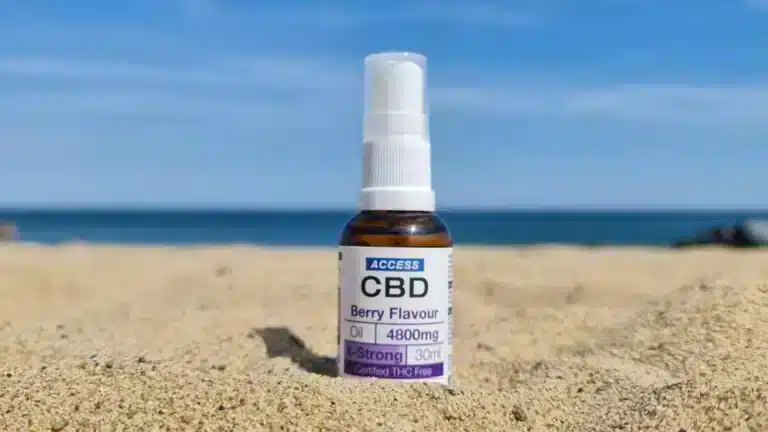Introduction CBD Oil Drug Test
With the booming interest in CBD and its myriad of applications, the UK has witnessed an escalating curiosity about its interaction with common drug screenings. How does this herbal wonder fit into the realm of substance detection?
This article seeks to shed light on this subject.
CBD, known formally as cannabidiol, has found its way into a plethora of wellness products, from the best CBD oil UK in 2023 to treatments like oil for sarcoidosis. As its prevalence grows, so do the questions surrounding its impact on drug tests.
But before we delve deeper into this topic, let’s first appreciate the nuances of drug testing methodologies and why they are employed. Moreover, distinguishing CBD from its infamous counterpart, THC, will be crucial in our exploration.
To guide you through this intricate subject, here’s a summary of what’s in store:
- A comprehensive look at drug tests & and their functionality
- Introduction to CBD and its myriad purposes
- Legal status of CBD within the UK
- Dissecting the differences between CBD and THC
- Deciphering the chances of CBD appearing on drug tests
Understanding Drug Testing Mechanics
From securing workplaces to ensuring safety in sports, drug testing plays an integral role. Drug tests are meticulously crafted to detect metabolites – the byproducts left after your body processes a particular substance.
But how do these tests work?
Among the myriad of screening methods, urine drug tests and hair drug tests are among the most widely used. Yet, they vary in their detection windows.
While urine tests might capture recent substance use, hair tests can offer a longer history. Moreover, there are also oral fluid tests and nail drug tests that serve specific purposes.
If you’ve ever wondered how long CBD oil takes to work or its lasting presence in the body, these testing methods offer valuable insights. It’s fascinating how the body processes and retains information about everything we consume.
CBD – The Herbal Phenomenon
Cannabidiol or CBD, as it’s popularly known, stands distinct from THC or Tetrahydrocannabinol. While both hail from the same plant family, their effects on the human body differ widely.
Many are drawn to CBD for its purported therapeutic benefits, which range from alleviating chemotherapy side effects to treating conditions like epilepsy and multiple sclerosis (MS).
In the UK, the array of CBD products has flourished, including niche items like CBD facial oil and offerings for pets, like CBD oil for dogs the UK. The landscape is vast, and the CBD oil benefits for skin alone warrant a closer look.
However, as CBD garners fame, understanding its legality becomes paramount. You might ask, is CBD legal in the UK? The answer is multifaceted, and the nuances of UK law surrounding CBD are worth exploring.

Navigating the CBD and THC Labyrinth
CBD and THC, although siblings are separated by their psychoactive components. While THC is renowned for its “high”, CBD lacks this psychoactive punch.
Yet, both have therapeutic potential, making their distinction even more crucial.
The legal status in the UK adds another layer of complexity. While CBD has secured its legality under specific regulations, THC remains largely prohibited.
The intricacies of cannabis oil drug classification uk further elaborate on this.
CBD’s Interaction with Drug Tests
Drug tests and screenings have always been a crucial aspect of employment in many sectors, sporting events, and other circumstances that require clear-headedness and sobriety.
As CBD products gain traction in the wellness industry and beyond, a prevailing question arises: Will consuming CBD result in a failed drug test?
To tackle this, it’s essential to grasp the specifics of how these screenings work and the substances they are designed to detect.
At the heart of this query lies the distinction between CBD and THC. Most drug tests are designed specifically to detect THC, the psychoactive compound found in cannabis.
Pure CBD, devoid of any THC, generally goes undetected as these tests aren’t calibrated to flag it. However, this doesn’t mean all CBD products are off the hook.
Full-spectrum CBD, for instance, comprises a wide range of cannabinoids, including trace amounts of THC. Regular consumption of these products, especially in larger quantities, can lead to the accumulation of THC metabolites in the body, which in turn might get flagged in a screening.
Contrastingly, broad-spectrum CBD and CBD isolate have undergone processes to eliminate or significantly reduce THC content. As a result, they pose a negligible risk of showing up on a drug test.
The intricacies of CBD products and their interaction with drug screenings become especially significant for individuals seeking therapeutic benefits. For those turning to solutions like CBD oil for back pain in the UK, it’s imperative to be well-informed about the product’s composition.
Knowledge of the differences between full-spectrum, broad-spectrum, and isolate formulations can help in making informed decisions, ensuring that one’s choice aligns with personal needs and constraints, thereby averting any unforeseen complications during drug tests.
Preventing Unwarranted Test Results with CBD
While the odds of CBD leading to a positive drug result are slim, being informed can make all the difference. When purchasing CBD products, always opt for reputable brands and consider third-party testing.
Knowledge of the different spectrums, from full-spectrum CBD to CBD isolate, will be your best ally.
Moreover, if faced with a drug test, being candid about your CBD use can help. Some even wonder about CBD oil UK and other medications and their combined impact.
It’s always best to consult a healthcare professional in such scenarios.
Lastly, with the widespread availability of testing, it’s essential to know where you can obtain reliable screenings. After all, having peace of mind is priceless.

Acquiring Trustworthy Drug Tests
The arena of substance testing offers various avenues. However, understanding the legal status of your test results is key.
For instance, what value does a legally instructed drug test hold?
Why Choose ACCESS CBD®?
There is a plethora of reasons to opt for ACCESS CBD® when considering a CBD purchase:
- Quality Assured: They provide tips on safely and legally purchasing quality CBD oil products, ensuring that you are consuming what’s on the label without any nasty surprises.
- Legal and Safe: All products adhere strictly to the UK’s CBD laws and regulations, guaranteeing a THC content of less than 0.2%.
- Informative Resources: For new users and seasoned veterans alike, ACCESS CBD® offers a comprehensive guide covering key information about CBD oil, from its health to safe usage practices.
How to Ensure You’re Getting the Best CBD Product
- Check the THC Content: Always ensure the THC content is below the legal threshold in the UK.
- Research the Product: Dive into the potential health and therapeutic benefits of using CBD oil and align them with your needs.
- Consult With a Medical Professional: Especially if you are on other medications, given that CBD may interact with certain medications.
In Conclusion
CBD and its interaction with drug tests is a nuanced topic. While the risk of a positive result due to CBD alone is minimal, being informed and choosing the right products can make all the difference.
As the realm of CBD continues to expand in the UK, fostering a comprehensive understanding will be invaluable.
For further reading and to deepen your knowledge on the topic, consider exploring:
- When was CBD oil legal in the UK?
- CBD Oil: Benefits, Uses, and Legalities
- Can you mix CBD oil with other medications?
Stay informed and let your wellness journey with CBD be an enlightened one.



